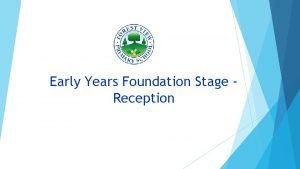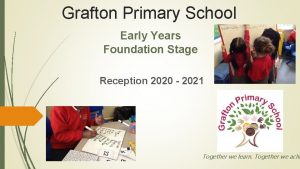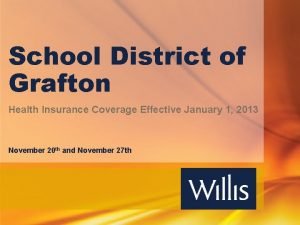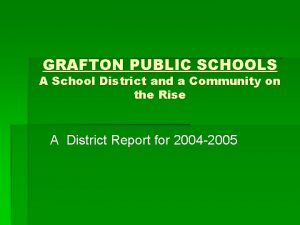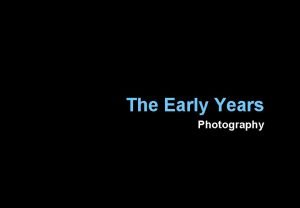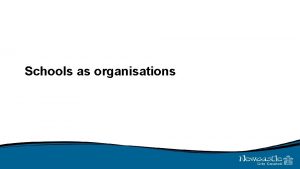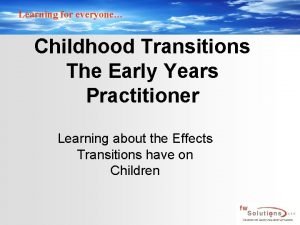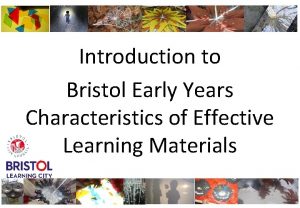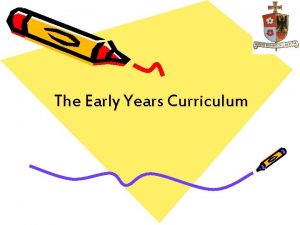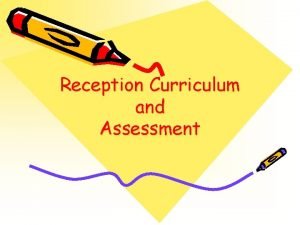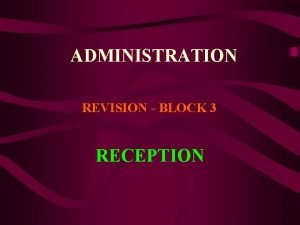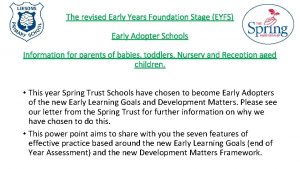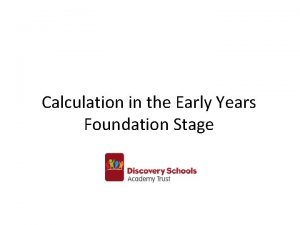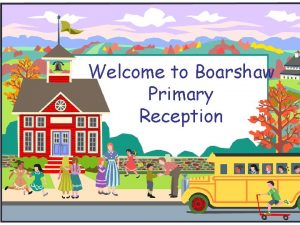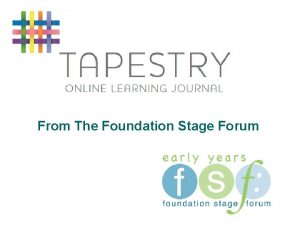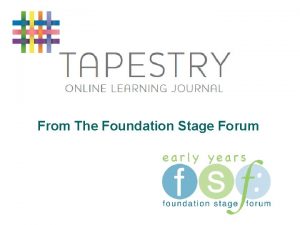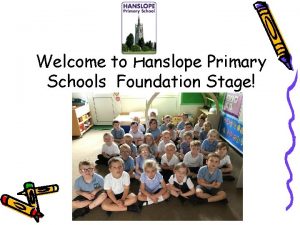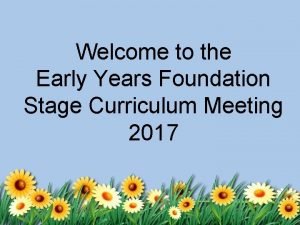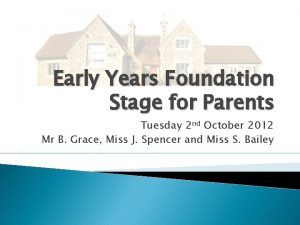Grafton Primary School Early Years Foundation Stage Reception
















- Slides: 16

Grafton Primary School Early Years Foundation Stage Reception 2020 - 2021 Together we learn. Together we achi

Welcome Children develop quickly in the Early Years and practitioners aim to do all they can to help children have the best possible start in life. At Grafton Primary School we strive to work collaboratively with parents and carers, this we see as a key component to being successful. We carefully plan the introduction of children into our EYFS setting to ensure that they settle quickly and flourish. We have been busy at school organising and preparing to meet all the new children. Here are some items that you will receive or have received from us: - Invite to meet your new teachers in September. - Reception booklet showing you pictures of your new classroom. - Diary dates (posted on the school website). We have also been speaking to your old Nurseries and teachers to find out more about you and also getting your classroom ready. We know that you may have many questions or worries about your child starting Reception which you have not been able to ask yet. If you would like to discuss any concerns or questions you have, then please email office@grafton. bardaglea. org. uk and we will respond as quickly as we can.

Meet the Class Teachers Yellow Class Blue Class Green Class Red Class Ms Archard You will also meet other adults in Reception who will help you with your learning. You will meet Miss Jenkins, Mrs Singleton, Mrs Casey, Ms Murton, Miss Almeida, Mrs Halls and Miss Bucktrout.

We are a Rights Respecting School We are proud to announce that we are a UNICEF Rights Respecting Gold School. We achieved this status in June 2019. A UNICEF Rights Respecting school puts the Convention on the Rights of the Child at the heart of the school’s every day practice. In the Convention, there are 54 articles which explain what children’s rights are. Article 29 Your education should help you use and develop your talents and abilities. It should also help you learn to live peacefully, protect the environment and respect other people. Our full report can be viewed on our school website. Here a few pieces of work that your child will be a part of at Grafton Primary School: - Every class will have a class charter, the children choose the five rights that they feel should be respected within their classroom and will be able to explain how they respect these rights. There will be an ‘Article of the Week’ each week which will help children understand their rights and how they can work to protect their rights and the rights of others both locally and globally.

Our EYFS Curriculum Children are encouraged to ‘have a go’, be willing and eager to engage with their learning and to ‘keep trying’, this fosters a positive approach to learning. Our EYFS practitioners support children to confidently express their own ideas, preferences and encourage children to ask and answer questions and find solutions to their problems so that they can achieve what they set out to achieve. We follow a play-based, structured curriculum which involves children learning through play. They are also directed to activities which are linked to topics and themes being taught. The activities allow children to have practical experiences such as cooking in our ‘mud kitchen’, playing with umbrellas in the rain or making potions and writing their recipes. We believe that the children learn best through a ‘hands on’ practical approach. The curriculum is delivered through an indoor and outdoor environment. Children can participate in physical activities everyday such as parachute games, climbing, and ball games with their friends and adults who support them to develop an understanding that we need to be active to help us to be healthy. Our curriculum links to the EYFS Statutory Curriculum with teaching being focused on children’s achievement of the Early Learning Goals (ELGs) by the end of Reception. The curriculum is broad and open-ended allowing us to follow the interests of the children. Children are taught the foundations for building all future learning upon, including the key skills of communication, working collaboratively, Literacy, Numeracy and thinking critically.

Healthy Bodies, Healthy Minds There has been a growing concern in recent years about a lack of physical activity and increased sedentary behaviour among young children. The current health status of young children has since been compounded by the recent pandemic. There has been an increase in the number of cases of young children suffering from mental health which can impact on their daily life. At Grafton Primary School, we believe in educating the whole child. We use programmes such as Mind Up and Thrive to teach children the neuroscience of how their brain works, how different feelings and emotions impact the brain and then lead to the actions they take. These programmes further promote executive functions and self-regulation (e. g. mindful smelling, mindful tasting), social and emotional understanding (e. g. using literature to promote perspective-taking skills and empathy), and positive mood (e. g. learning optimism, practising gratitude). These activities are aimed at changing the ecology of the classroom environment to one in which belonging, caring, collaboration and understanding others is emphasized to create a positive classroom culture. We believe that fostering children’s social and emotional development is vital, but it also supports the development of cognitive abilities leading to academic success. Children will use the wider curriculum to support them in having a healthy body and mind. They will participate in Therapeutic Art lessons, PE, Drama, Music, PSHE, etc. Our Grafton Community Curriculum underpins our planning and approaches to teaching, knowing that it is not just about what we teach children in the classroom, but how we teach the whole community to take care of themselves and those in our community.

What a typical Reception day is like We use a daily structure which changes throughout the academic year as the children settle into school life, adjust to their new environment and are ready for the next challenge. As our curriculum is based on providing opportunities to play and for everyone to talk, our daily routine allows plenty of time for this to happen. Below is what a typical day looks like: • Children come into school and self-register and choose activities/resources to play • Morning registration • Whole class teaching and learning • Learning indoor/outdoor at chosen, adult-directed or adult-focused activities • Whole class Phonics teaching and learning • Learning indoor/outdoor at chosen, adult-directed or adult-focused activities • Whole class teaching and learning • Lunchtime – children will eat and then be able to play outdoors • Afternoon registration • Whole class teaching and learning • Learning indoor/outdoor at chosen, adult-directed or adult-focused activities • Whole class teaching and learning • Story and singing • Home time

Tips for reading with your child at home At Grafton we aim to continue and encourage children to have a love of language, stories and reading. We have an environment that celebrates story telling and reading with enjoyment – supporting children on their journey of being lifelong readers. We use a core text every one to two weeks with the children. The core text is chosen as it supports developing a range of reading skills such as children learning the high frequency words (words which are regularly found in any text). The texts also provide good points for discussion, encouraging children to draw upon their own experiences to help them understand what they are reading and what they think will happen next. Once the children are settled, we will invite parents to a Reading with your Child workshop (this may take place online). During this session, we will share with you how we teach reading in Grafton and hopefully you will be able to see teachers teaching reading within the classroom. Your child will then bring home their first reading book. At home, you can support your child in getting ready to read by learning the alphabet song, naming the letters of the alphabet and helping them to recognise the different letters by sight. You can start to teach them the high frequency words (see the next slide) to see the words they should know by the end of Reception.

High Frequency Words These are words which we want children to be able to read and write by the end of Reception.

Help your child be ready for school There are many ways that you can help your child be ready for school. Here are just a few things that you can do to support them: • Read stories about starting school and talk about what it is going to be like. If you don’t have stories about starting school, just reading to your child is important as they are developing their skills as a reader by sharing stories with you • Encourage your child to get dressed and undressed by themselves – they could practise putting their school uniform on and then taking it off to get changed for PE, or practise putting on their own coat • If your child needs help going to the toilet, try and encourage them to do this more by themselves • Encourage your child to feed themselves at meals times. Can they use a knife, fork and spoon to feed themself, if not, help them to use these when eating. Help them to learn how to open any food packets that may be in their lunchbox • Encourage your child to wash their hands regularly and learn other good hygiene practices such as what to do if they need to blow their nose • Sing songs – it could be nursery rhymes (old and new), songs that involve counting or rhyming words • Practise counting objects – encourage your child to line objects up and count them carefully. Practise recognising numbers up to 10 and try writing them • We have some useful worksheets that you could use with your child on our Nursery Home Learning page of our website • Read useful documents that will help you understand about teaching and learning in the Early Years (Nursery and Reception) See some useful links below: • https: //www. foundationyears. org. uk/files/2015/04/4 Children_Parents. Guide_2015_FINAL_WEBv 2. pdf • https: //www. graftonprimary. co. uk/attachments/download. asp? file=1154&type=pdf • https: //www. scholastic. com/parents/books-and-reading-guides/raise-reader-parent-guide-to-reading-ages-3 -5. html

Our Uniform code – be proud to wear it At Grafton, we believe the wearing of a school uniform gives an immediate sense of belonging to our school community. The high standard we set in appearance is a signal to everyone outside the school of our expectations in effort, work and behaviour. So we have a uniform code that we like our children to adhere to every day. Girls Grey skirt or trousers no leggings or tracksuit bottoms Red cardigan, jumper or fleece (Nursery, Reception, Year 1, 2, 3, 4 and 5) Grey trousers (short) White polo shirt Pinafore skirt Dress (red and white check) Short-sleeved white blouse Grey tights White socks (any frills must be in school colours) Navy jumper (Year 6) Footwear – black shoes or trainers. No platform shoes, boots or bulky trainers Boys Grey trousers (long) Grey trousers (short) White polo shirt White buttoned shirt Red jumper, cardigan or fleece (Nursery, Reception, Year 1, 2, 3, 4 and 5) Navy jumper (Year 6) Footwear – black shoes or trainers. No boots or bulky trainers Please label all uniform with your child’s name. Children often misplace uniform and we can return it to its owner if it has a name inside.

Our Uniform code – be proud to wear it School P. E. Kit T-Shirts - White, no wording or pictures. PE tops with the school logo can be bought from Premier School Wear. Shorts - Red, black, blue, navy, or white with no words or pictures on them Footwear - Black plimsolls. Trainers may be worn for outside lessons. Children may wear grey or black tracksuits or jogging bottoms for games outside when it’s cold. Please mark all P. E. kit clearly with your child’s name. PE kit needs to be kept in a small bag and will be kept in school in the classroom. This will be sent home periodically and at the end of each term to be washed. Due to current government guidance to schools in light of Covid-19, children will be asked to come to school in their PE kit on PE days. You will be informed of which day of the week this is during the Autumn term. Here a few reminders as to the standards we like to set There is a strict no jewellery policy. The wearing of earrings is not permitted at any time. Please note that if your child has earrings on, including studs, plastic, wooden or string forms they will either have to remove themselves, if capable, or a member of the office team will remove them, with permission from parents or the parent/carer will be called to the school to help remove them. Children will not be allowed into class with them on. Watches are allowed. Smartwatches are not allowed No nail varnish is permitted at any time, neither are tattoo transfers, false nails or make-up. This is also the case on non-uniform days. Any children coming to school wearing inappropriate clothing/shoes will be asked to change into spare clothes. These are stocked in the school and then they can change back at the end of the day. Please note that all worn clothing is washed daily. PLEASE NOTE It is advisable that if you're thinking to get your child's ears pierced, have this done at the beginning of the summer holiday. Which will leave enough healing time before your child returns to school.

Meeting your Teacher and your first day Your teacher has sent you an invitation to come and meet her and some of the other adults in Reception during the week of 14 th September. This meeting is a chance for you to meet your new teachers and for your teachers to get to meet you. They will ask you what you like to do and play with, whethere is anything that you don’t like and ask you if there is anything that you would like to know about school. You will get to play and have a look at your new class and our outdoor area. (As the school is having to follow recommended Government guidance to keep everyone safe, we ask that parents arrive on time for their appointments. Unfortunately we are only allowed to invite one child and one parent in to school for an appointment, so wherever possible, we ask that parents organise for a family member or friend to look after any other siblings. Parents and children can wear PPE if they would rather, but staff will be adhering to the current social distancing rules of 2 metres – unless Government guidance has changed by this point. When you arrive for your appointment, the teachers will come and meet you at the main school gate and take you through the garden into the classroom). During your visit, your new teachers will tell you all about when you will next be coming to school and what is going to happen. Some of you may start coming to school just for the morning for a few days, some of you will come just for the afternoon for a few days. So you will not meet all your new class friends for a few weeks, but by the end of September, you will have met everyone in your new class. Your teachers will tell you where you will come into school and where your parents/carers can collect you from when it is time to go home. When you start to come to school, your teachers will show you what is in class and in the garden to play and learn with, where the toilets are and where the lunch hall is. They will come out and meet you in the playground on your first few days so that they can help you find your way to class – but don’t ever worry about getting lost, all the adults at school will help you if you are not sure where to go.

Lunchtime In the first few weeks, we ask that parents/carers send their children with a packed lunch from home. We are aware that children in Reception, Year 1 and Year 2 are entitled to Universal free School meals, so if you really need to, then you can ask for a school packed lunch. However, we do often find that one way of supporting the children to settle when they start to stay for lunch at school, is to make sure that they are eating food that they like. We ask that packed lunches are healthy. Below is a link to a leaflet to support parents in supplying a healthy pack lunch. https: //www. foundationyears. org. uk/wp-content/uploads/2017/11/Healthy-packed-lunches-for-early-years-FACT-SHEET. pdf At the beginning of the term, Reception children will be eating their lunch in the school hall. As the term continues and Government guidance relaxes more, Reception children will be able to order hot meals to eat if they would like to rather than bringing a packed lunch. If it is possible at this time, we would like to invite parents to sample what a school dinner is like. In previous years we have invited parents into school to enjoy having a lunchtime with their child. If we find that we can’t do this, then we will try and arrange a take away service. Once the children have eaten, they are then able to play in the playground. We have many midday staff who will support the children when they are eating or play games with the children when they are outside. Each Reception class will have a midday allocated to them. The member of staff will be aware of any dietary needs and can feedback to the class teacher as to how each child has eaten. If you have any worries or concerns over your child’s eating, then please do either email us or please tell your child’s teachers during your meet the teacher visit.

Home learning We provide regular home learning, which is always linked to the learning that we do in class. Each child will have a home learning book and the teachers will put work in there regularly to complete at home and then return to school. We often set project work which involves children designing and making using a range of materials. We share this work in school and celebrate what has been learnt and achieved. Once children are given reading books, we ask that they read regularly with you at home – at least four times a week, and that you put a comment in their reading record. By making a comment, we can communicate with each other and work together to develop your children’s love of reading and their reading skills. We will change their reading books weekly in school and monitor their progress. Practise their high frequency words at home. We would suggest focusing on a couple of words each week. We will send out which words we are focusing on weekly, but if your child already recognises and can read and write this word, then please do start to learn some of the other words. Take your children out to visit different places and have different experiences. This will give them knowledge that they can use and share when making links between different topics and themes. What is really important and will really help your child’s learning is talking to them. Children learn so much through conversation with family, friends and peers. Talk helps to develop their vocabulary, give them ideas, lets them express their ideas, challenges their thinking, teaches them important social skills and helps them to build further relationships. Talking can give your child further self-confidence and is a fundamental life skill.

See you in September! We have given you lots of information about starting school and we really can’t wait to meet you. We hope you have a really fun summer break! Remember, if you want to ask any further questions, then please send an email to office@grafton. bardaglea. org. uk and we will get back to you as soon as we can. Please ensure that the office has your up to date contact details as we will have to communicate with you electronically for the time being. Don’t forget that you can do lots to get ready for starting in Reception – we have some home learning ideas on our Nursery section of our school website.
 Early years foundation stage pack
Early years foundation stage pack Temple grafton school
Temple grafton school Grafton primary school website
Grafton primary school website Pwsb mortgage rates
Pwsb mortgage rates Solar shop grafton
Solar shop grafton Grafton county jail
Grafton county jail Grafton public schools
Grafton public schools Sheep years to human years
Sheep years to human years 300 solar years to lunar years
300 solar years to lunar years How long is four score and seven years
How long is four score and seven years Applying reception school
Applying reception school Who is shakespeare
Who is shakespeare Early years photography
Early years photography Summarise types of early years provision
Summarise types of early years provision Medway early years
Medway early years Effects of transitions in early years
Effects of transitions in early years Bristol early years characteristics of effective learning
Bristol early years characteristics of effective learning
